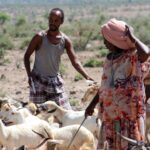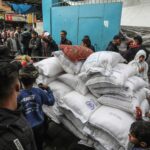As global temperatures rise and climate-related disasters become more frequent, the need to adapt is rapidly increasing. That need for adaptation—from adjusting farming practices to diversifying livelihoods and strengthening infrastructure—is most acute in vulnerable low- and middle-income countries such as Bangladesh, Ethiopia, Haiti and Viet Nam.
2025 Global Report on Food Crises: Rising food insecurity, waning humanitarian assistance
The world faced a stark inflection point in 2024, as the continued rise in the number of people facing crisis-to-catastrophic levels of acute food insecurity meets sharp reductions in funding for humanitarian assistance. The 2025 Global Report on Food Crises (GRFC), released May 16, reports that 295.3 million people across 53 countries/territories faced acute food insecurity in […]
Agrifood science in transition: Building a sustainable architecture in the face of declining development aid
The future of agrifood science was in full view at CGIAR Science Week in Nairobi, Kenya, in April. Expert panels devoted to climate adaptation, digital innovation, soil health, equity, and food systems transformation brimmed with ambition and sophistication. There was much to celebrate: New tools, new partnerships, and bold visions of what research can deliver in the […]
Beyond the hype: Centering humans in CGIAR’s genAI research
The rise of artificial intelligence (AI)—and more recently, the expanding availability and growing public use of generative AI (genAI)—has sparked interest across scientific and policy communities. GenAI refers to a class of models that generate text, images, code, and other content by identifying patterns in vast datasets. These tools allow users to interact with AI […]
Applying the Women’s Empowerment Metric in National Statistical Systems (WEMNS) to build gender equity
Governments’ adoption of the Beijing Declaration and Platform for Action in 1995—which advanced a set of common principles on gender equality—elevated women’s empowerment in policy as an end in itself, not just as a means to achieving other development outcomes. While great strides have been made in developing tools to track progress toward gender equality since […]
- « Previous Page
- 1
- 2
- 3
- 4
- 5
- 6
- …
- 23
- Next Page »





